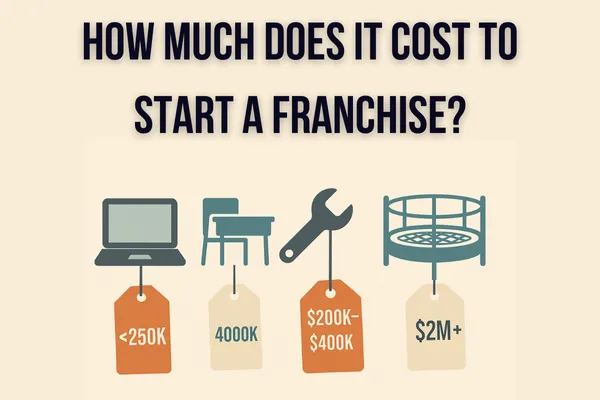
How Much Does It Cost to Start a Franchise? | Franchise Startup Costs Explained
How Much Does It Cost to Start a Franchise?
One of the first questions every prospective franchisee asks is simple but critical: “How much does it cost to open a franchise?” The answer, of course, depends on the type of business, the model, and how you plan to operate. But there are clear patterns and ranges that can help you understand what to expect.
The Big Picture: One-Time vs. Ongoing Costs
Startup costs break down into two main buckets:
One-time costs: Franchise fee, build-out, equipment, initial marketing, working capital.
Ongoing fees: Royalties, national marketing fund, technology fees, and other system support costs.
Understanding both matters. You don’t just need enough to open—you need enough to stay open until you hit break-even.
One-Time Costs
Franchise Fee
Most brands charge between $40,000–$60,000 for the right to operate under their name.
Build-Out and Equipment
This varies dramatically:
Home-based franchises (consulting, mobile services): typically under $250,000 all-in.
Equipment-heavy franchises (trades, restoration, fitness): $200,000–$400,000.
Small retail/classroom spaces (education centers, tutoring): around $400,000 or less.
Large footprint concepts (trampoline parks, dog parks): up to $2 million or more.
Working Capital
Franchisors usually recommend three months of working capital, but that’s often optimistic. Talk to franchisees. Find out when they broke even and whether they needed extra cushion. Starting right before an off-season? You’ll need more.
Your Own Salary
Franchise disclosure documents (Item 7) don’t include money to pay yourself. If you need a paycheck from day one, you’ll need to plan for that on top of the stated costs.
Ongoing Costs
Every franchise comes with recurring obligations:
Royalties: usually 6–8% of revenue.
Marketing fund: usually 1–3% of revenue, pooled for national campaigns.
Technology and support fees: for systems like CRM, call centers, or proprietary software. These are often comparable to market rates, but you’ll pay them monthly.
If the franchisor bundles services like marketing or call center support, you may save compared to sourcing them yourself—but they still add to your monthly obligations.
Why Capital Cushion Matters
Plenty of good businesses fail not because the model was flawed, but because owners ran out of cash. If you’re debating whether you have “just enough” to scrape by, the reality is you probably don’t. It’s almost always better to wait, save, and start strong rather than enter underfunded and risk being forced to cut back on operations or marketing at the exact moment you need them most.
Where to Find the Numbers
The full breakdown of startup costs is always disclosed in Item 7 of the Franchise Disclosure Document (FDD). These are public and often available online, and franchisors are legally required to provide them.
Bottom Line
Franchise startup costs span a wide range—from under $100,000 to nearly $2 million—depending on the concept, build-out, and equipment requirements. On top of that, you’ll face ongoing royalties, marketing contributions, and support fees. The smartest move is to prepare for more than the franchisor’s minimum estimate. Having a strong cash buffer gives you room to weather seasonality, delays, and the realities of building a new business.
